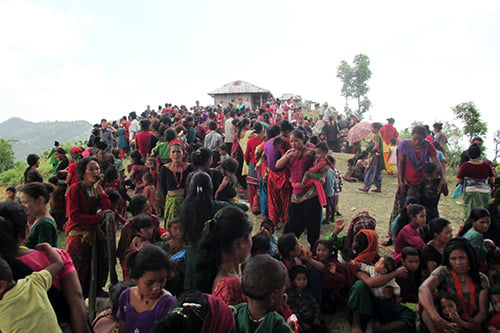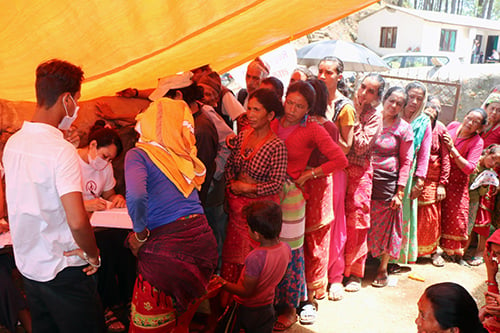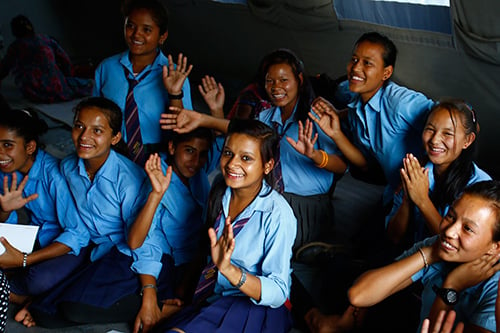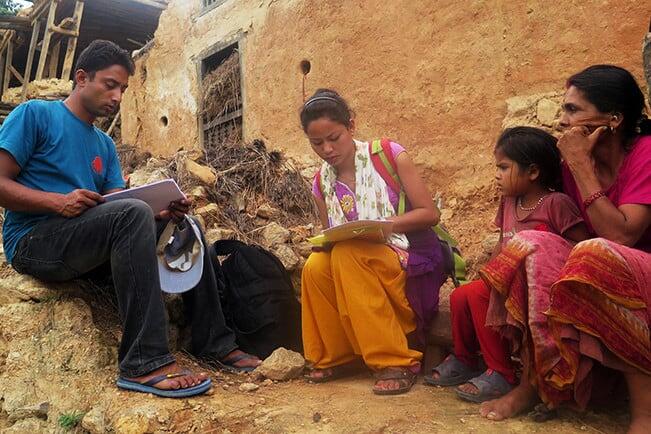SINDHULI, Nepal – Millions are still reeling from the massive earthquake that rocked Nepal in April. Over 8,600 people were killed, over 100,000 were injured, and tens of thousands are now homeless. Yet amid the catastrophe, a new kind of hero emerged – young humanitarian responders, who have proved essential to relief efforts.
“Although we have less social power than political leaders and full-time social workers, young people have an important role to play in emergencies,” said Janak BK, 24, who visited some 30 villages and met with about 700 earthquake survivors to assess their needs and provide support. He is one of dozens of young people working with UNFPA on quake relief in Sindhuli District.

UNFPA has long supported ‘youth networks’ – groups of young people who receive training and support to become involved in local planning, and to promote health and human rights messages in their communities. Members of these networks reach out to peers and neighbours with information about ending gender-based violence and child marriage, for example, and how to improve reproductive health.
Since the earthquake struck, UNFPA has been working closely with youth networks to coordinate its humanitarian efforts, including identifying vulnerable populations and ensuring they receive assistance.
An immediate response
Already organized and effective, the young people were quick to respond when the quake struck.
“One thing that immediately came to my mind was a desire to reach as many affected villages in my home district and offer people as much support as I could,” Janak said. “Luckily, nothing happened to my family members so I could think of others,” he added.
Ignoring the cracks that had formed throughout his home, he rushed to three nearby houses that had collapsed, providing the families with his own supplies.
“Some members of youth networks called me soon after the earthquake, expressing their genuine interest to be part of UNFPA’s emergency responses, and we straightaway brought them on board,” said Sanjay Sharma, UNFPA’s programme expert in Sindhuli.
Young people have played a key role in much of UNFPA’s quake response, including the organization of mobile reproductive health camps, which bring critical care to remote communities, and the distribution of dignity kits, which contain essential hygiene materials. “We tried to bring as many pregnant women, new mothers and adolescent girls, including those from rural areas, [as we could] to the camps and designated places,” said Gita Achhami, 21.

Young people have also cleared rubble, helped respond to the threat of gender-based violence, and provided emotional and logistical support, earning accolades from Prime Minister Sushil Koirala and other officials.
“Their participation in rescue and relief work was very encouraging,” said Mahendra Prasad Paudel, Under-Secretary at the Ministry of Youth and Sports.
Honing their skills
Many young people found that the programmes were an opportunity to expand and develop their skills.
Forty-two young people were mobilized by UNFPA to collect data from hundreds of affected families, part of a needs assessment conducted by the National Planning Commission. “It taught me how to extract complex information, such as income, damage, inequality, human suffering, etc, from a quick household survey,” said Prabina Duwal, a young researcher from Bhaktapur District.
“At times, the experience of listening to people’s helplessness was traumatic,” admitted volunteer Sindhuli Sudip KC, adding that in the end, it was “a rare opportunity.”

UNFPA also conducted trainings for 75 members of the Nepal Scouts on how to prevent and respond to gender-based violence. “The orientation was a real eye-opener. We had already heard about a few cases of rape in camps,” said Preena Khanal, 23, who was assigned to share this information in three affected districts.
Other orientations focused on preventing child marriage, preventing HIV transmission, and providing accurate family planning information.
Health educators were also trained to provide age-appropriate health information and assistance to young people at the reproductive health camps. Many adolescent girls are more comfortable learning about these issues from the volunteers, said Shrestha, a health educator. “Sometimes at school, the teachers are men and it’s not the same,” she said.
But most of all, the young responders were driven by a desire to help those around them. “So many people were badly affected by the earthquake, but I am okay,” said Nisha Shrestha, who volunteered at a mobile reproductive health clinic, “so I want to help those in need.”
–Santosh Chhetri


